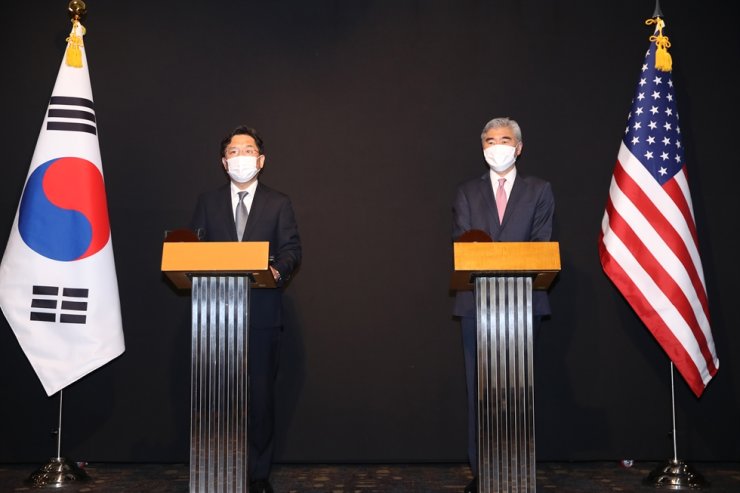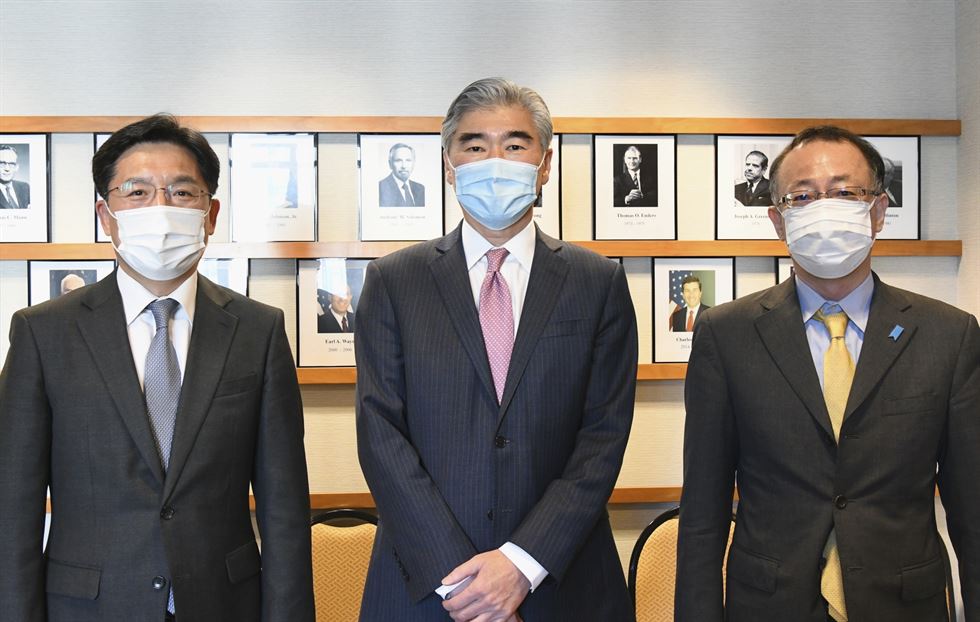Seoul, Washington remain apart on North Korea policy
 |
| Special Representative for Korean Peninsula Peace and Security Affairs Noh Kyu-duk, left, and U.S. Special Representative for North Korea Sung Kim hold a press briefing after their meeting at a hotel in central Seoul, Sunday. Joint Press Corps |
By Jung Da-minThe top envoys from South Korea and the United States charged with negotiations regarding the denuclearization of North Korea still remain poles apart over the details of any engagement policy toward Pyongyang.
Special Representative for Korean Peninsula Peace and Security Affairs Noh Kyu-duk and U.S. Special Representative for North Korea Sung Kim met in Seoul, Sunday, to discuss how to bring North Korea back to negotiations. They also reviewed Seoul’s proposal for a declaration officially ending the Korean War in their second meeting within a week after they met in Washington, Oct. 18 (local time).
However, diplomatic experts said the two envoys only reaffirmed the differences in approach between Seoul and Washington without reaching any further agreement on President Moon Jae-in’s proposal to formally declare an end to the war. They also said Washington has virtually rejected this, with Kim saying the U.S. would “explore different ideas and initiatives, including the Republic of Korea’s end-of-war proposal.”
After their meeting at a hotel in central Seoul, Noh said: “In particular, I had in-depth discussions with Special Representative Kim over Seoul’s proposal to end the war in an extension of talks we had in Washington. We also reaffirmed our shared stance that we could discuss every possible idea including those involving the North’s interests, once we resume talks with North Korea.”
Noh said the two agreed to continue to push ahead with various engagement policies toward North Korea including providing humanitarian aid and confidence building, based on the shared perception that dialogue and diplomacy are urgently needed for denuclearization of the Korean Peninsula and the establishment of a permanent peace on it.
Regarding proposal to end the war, Kim said: “I look forward to continuing to work with special representative Noh to explore different ideas and initiatives, including the Republic of Korea’s end-of-war proposal as we continue to pursue our shared objectives on the peninsula.”
Kim also reaffirmed Washington’s previous stance that it was “ready to meet with the Democratic People’s Republic of Korea without preconditions,” adding the U.S. harbors no hostile intent toward the North and was waiting for a positive response to its call for dialogue.
However, Kim’s statement differed from that of Noh in the details, such as him mentioning the importance of trilateral cooperation between the U.S., the Republic of Korea and Japan, and calling North Korea’s recent ballistic missile tests “concerning and counterproductive to making progress towards a lasting peace on the Korean Peninsula,” both of which were not included in Noh’s remarks.
 |
| Noh Kyu-duk, left, South Korea’s special representative for Korean Peninsula peace and security affairs, poses for a photo with Sung Kim, center, U.S. special envoy for North Korea, and Takehiro Funakoshi, head of the Japanese Foreign Ministry’s Asian and Oceanian Affairs Bureau, prior to their talks in Washington Oct. 19 (local time). Courtesy of Ministry of Foreign Affairs |
Kim Jun-seok, a politics and diplomacy professor at Dongguk University, said among other points where the two countries differed after the latest meeting between the two special envoys was Washington making it clear that it would raise human rights issues when holding a meeting with the North, a clear message that it would pressure Pyongyang.
“The most worrying thing about the different statements of the U.S. and South Korea is that North Korea might get the impression that the South is unable to play a role in bridging the U.S. and the North, when the South itself faces challenges of narrowing down its gap with the U.S,” Kim said.
He added that the domestic political situation in the U.S. was also adding to difficulties in any U.S.-North Korea dialogue as the Joe Biden administration does not want to make conciliatory gestures toward North Korea when its support rate has been dropping because of its diplomatic policies, especially after the withdrawal from Afghanistan.
Park Won-gon, a professor of North Korean studies at Ewha Womans University, said it was natural that the U.S. and South Korea have remained apart over Seoul’s end of war proposal as their needs differ considering the domestic political situations in each country, also referring to the Biden administration’s loss of popularity because of its diplomatic policies.
“People were looking to see whether there would be a new initiative from the U.S. regarding South Korea’s end-of-war proposal, but Kim only repeated Washington’s previous stance that it would meet with the North without preconditions, and is committed to address humanitarian concerns in the North,” Park said. “Kim said Washington would explore different ideas and initiatives including Seoul’s end-of-war proposal, but he said the U.S. side would consult on the matter with the South Korean side, not the North.”